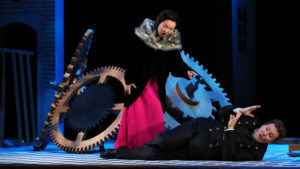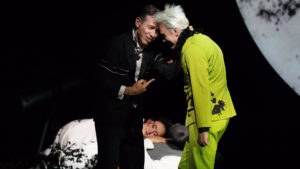Perhaps no one was as surprised to find conductor Harry Bicket taking on the role of Chief Conductor at Santa Fe Opera in 2014 than the man himself. He’s best known as the leader of The English Concert and is renowned for his work leading orchestras and operas across the world.
“Lots of things draw me back,” he said last week during our conversation. “There is something very interesting, I think, about how we work and where we work. If you work at the Metropolitan Opera, which I’m very lucky enough to do every year, I walk down to Lincoln Center and I go in a back door. Then I go down three floors into the subterranean basement where there is no natural light, where the air is of dubious quality and you rehearse in these boxy rooms all day. Just the difference between that and driving up to the opera in the morning under a crystal blue sky and rehearsing outdoors. We have hummingbirds flying behind us, we occasionally have to sweep snakes off the campus when we come in, the flowers. It sounds like nothing, but, particularly this year after having all the traumas of lockdown, if you can get people before they even arrive for work to have their hearts filled with a positive spirit and a happiness, half your work is done.”
And he has a lot of work this year. He’s conducting productions of Mozart’s The Marriage of Figaro and Benjamin Britten’s A Midsummer Night’s Dream. The former is one of the most regularly performed works and the latter a much less well-known opera.
What follows are excerpts from our conversation that have been edited for length and clarity.

Is there such a thing as a perfect opera and do you think The Marriage of Figaro is that opera?
I think it is pretty close. It think it is the perfect marriage, pardon the pun, of music, libretto and voice and production and orchestra in the performance at least. It is very hard to find that sweet spot where everything is so completely unified. You’re not aware of the libretto being one thing and the music being something else. It’s just a complete fusion and I think that’s what Mozart and [librettist] Da Ponte achieved with Figaro.
As popular as it is, you’ve conducted it countless times. Are new discoveries still there to be found for you in this opera?
I think that as a conductor one thing you should do is also see what your orchestras and cast bring to the table. In that sense every time I do it is different. Working with the director also has to be added to the mix. So one has to be a bit of a chameleon, but then one also has to be very respectful of Mozart and of the music. It’s sort of a balancing act, but because of that I think every time I conduct the piece it’s slightly different and you want to find different ideas and different colors.
In 1948 a scholar Hans Keller, made the argument that there were many parallels between Mozart and Britten, notably in their “exaggerated importance attached to historical perspectives.” What, if any, similarities do you find?
That’s such a tough question. Because also I think that for Britten a lot of stuff was quite personal as a gay man at a time when it was illegal. It was also historical perspective for him. In all of the operas there’s a sense of this outsider and a person who is not proselytizing or complaining about the situation, but is clearly referencing it. You see that in Peter Grimes, you certainly see that in Billy Budd and to a certain extent there is an element of that in A Midsummer Night’s Dream. The whole wedding thing – in the play they kind of all do get married at the end. And in the opera that whole thing is kind of mysteriously swept under the carpet perhaps because Britten and Peter Pears couldn’t get married. I don’t know. I don’t want to read too much into that.
For Mozart it was a similar thing. He was writing in the 1780s and there was the US revolution, the whole French situation, the situation in Vienna. I think that had to be something that influenced him every day of his life.

What surprises you most about the way Britten set Shakespeare’s play with his music?
It doesn’t surprise me that it’s brilliantly set. Most composers would really shy away from setting very very high end poetry because you’re on a losing wicket. How can you ever dare to aspire musically to the kind of quality of the text. Even Verdi when he was writing his Shakespeare operas he didn’t dare actually take on Shakespeare’s text. Britten is one of the few people in history that actually set Shakespeare’s text and all but one sentence is the original Shakespeare.
Britten told Joan Peyser of New York Times in a 1969 interview that “it is better to be a bad composer writing for society than to be a good composer writing against it. At least your work can be of some use.” Wasn’t Britten actually being both a good composer and writing for society at the same time?
I don’t think it is necessarily an either or. I think it’s kind of a both and. But I think Britten did feel very strongly obviously about so many things. He was a conscientious objector during the war. The War Requiem is very clearly expressing a moral outrage about the senselessness of war. Not a political thing, but a human response to that. I think certainly the theme through his pieces is just about how we treat people in society who don’t necessarily fit in. He was obviously quite bitter about it, but also realized as an artist he was in a unique position to actually talk about it in a way that wasn’t offensive. He was provocative and allowed people to be challenged. Not in a threatening way, but in a way which hopefully caused conversation and then many years later actually caused something to be done about that.
For tickets to The Marriage of Figaro please go here. There are performances on August 3rd, 10th, 14th, 18th, 21st, 24th and 27th.
For tickets to A Midsummer Night’s Dream please go here. There are performances on August 4th, 13th, 19th and 25th.
This is the second of our week-long series of interviews with artists participating in this year’s Santa Fe Opera season. Check back on Wednesday for our interview with counter tenor Iestyn Davies who sings the role of Oberon in A Midsummer Night’s Dream.
Main Photo: Conductor Harry Bicket (Courtesy Santa Fe Opera)










